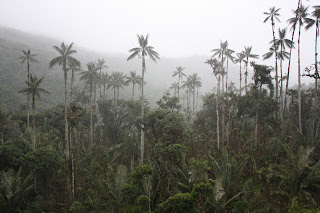Scaphosepalum dalstroemii, "his" species, grows in one the southernmost point of Ecuador. It is soooo far south that our GPS kept on indicating that we were in Peru.
We went to Loja and had the collaboration of the most wonderful people at the Technical University of Loja (UTPL). This region of the Andes is completely different than the central and northern regions of Ecuador, the topography is different and even though the mountains are lower, the bitter cold of the highlands of the north is present if not worst in this region.
We found a Fernandezia in the dwarf forest on the pass of Loja-Zamora road, Carlos Naranjo, Beto Mendoza and Lorena Riofrio, my collaborators from UTPL, Loja. Not a lot of Pleurothallids since the draught has affected this region for years.
We went all the way down to Zamora, a beautiful little Amazonian town in less than an hour, botanizing, looking for orchids and found some incredible populations of Phragmipediums.
We continued our trip in the search for Scaphosepalum dalstroemii and we stopped in Amaluza to sleep overnight and continue the next day to Jimbura, the type locality of this species. The most important lesson of that night is: Don't stay in a hotel next to the rooster fight arena. You will not be able to sleep.
Back to business:
This is where Scaphosepalum dalstroemii lives, it is truly sublime and in a way I am happy that is difficult to get to otherwise it will be colonized and destroyed. There is some evidence of fire in the area, a common practice in the highlands, but the populations of this little Scaphosepalum are in good shape. This species is not common in the market, and if you stay tuned to my publications you will know why. I cannot spoil the surprise!
As evidence of how sublime and cold this place is I am adding some pictures of for example a stairway to....heaven? And the Lorenas (Riofrio and Endara) trying not to freeze.
Now, the roads....a comment on the roads....Ecuador has some incredible highways, better than other neighboring countries and I am really proud to be Ecuadorian for this reason BUT this one has to be the exception. The road Jimbura to Zumba might look in the map like eight miles but it is actually 12 hours of driving (you can cross Ecuador in 13 hours if you use the Panamerican highway) but this road is so far south that the government forgot about it. We saw the most beautiful southern Ecuadorian forests like for example this patch of endangered palmsbut we almost crashed three buses, many rocks, ran over cattle, cross a river that we could feel the water rumbling underneath our truck and see the water above our windows. I am used to bad road but this "summer" road is nothing like anything I have been before.
For your delight, a movie of one of our almost crashes against a rock at the end of a hill on a muddy road (I hope our parents not reading this part...)
Before I forget.... So in retrospect now the Saints in trucks and buses have a lot more meaning, notice that this Divino Nino (Divine Baby) has lightning on the sides, just to keep him awake!











No comments:
Post a Comment